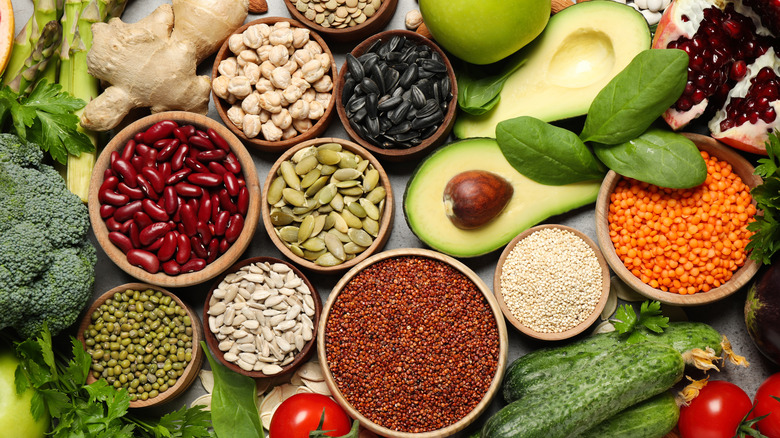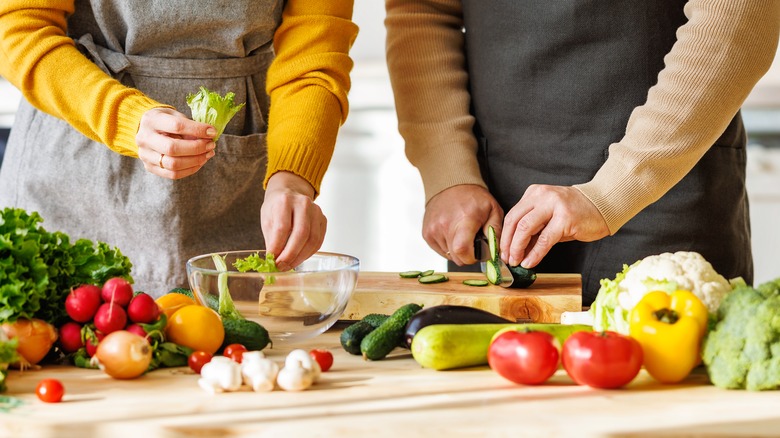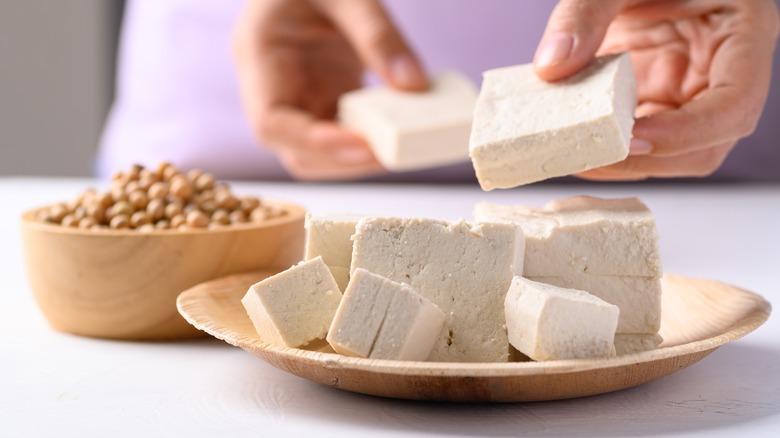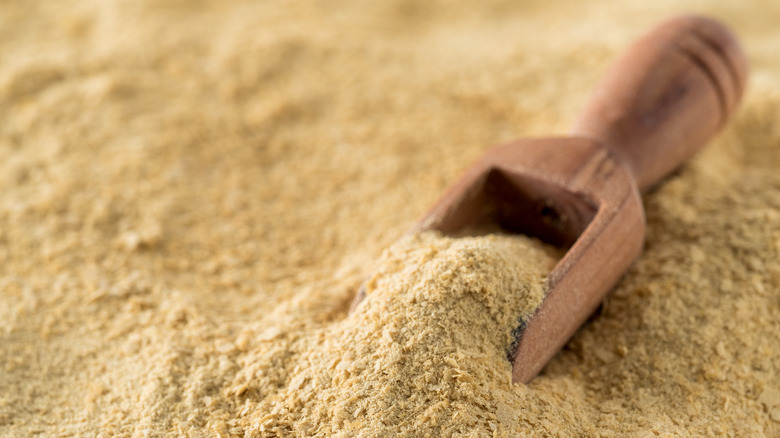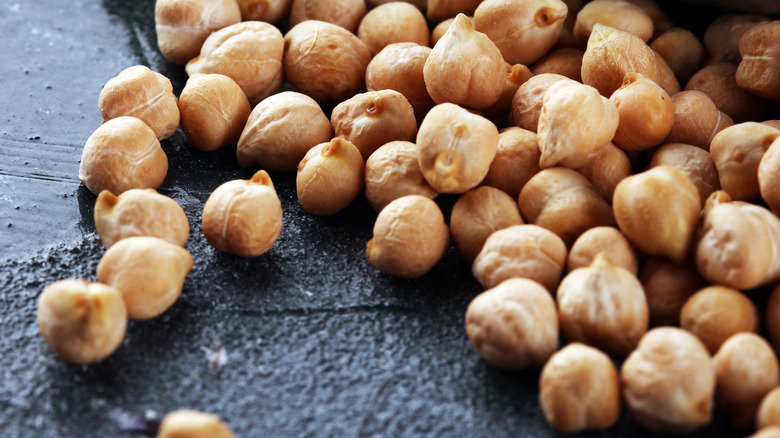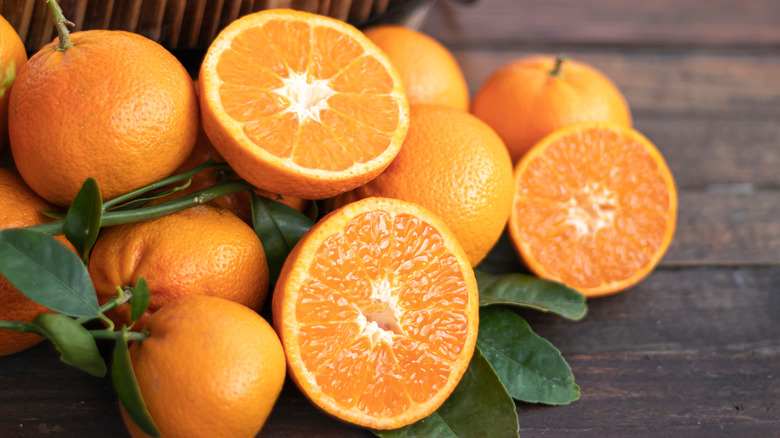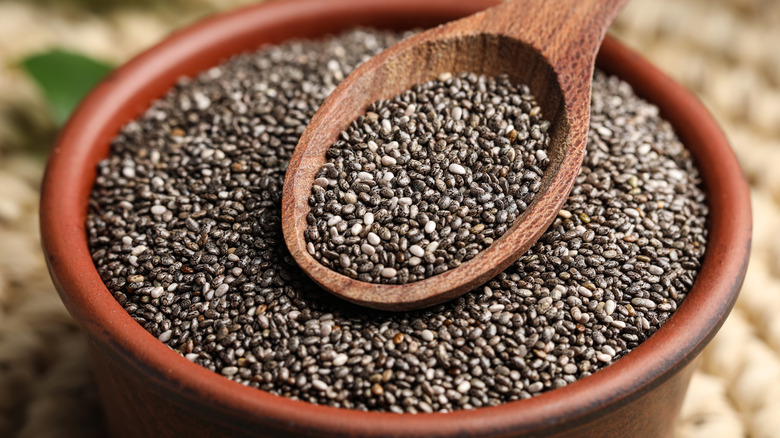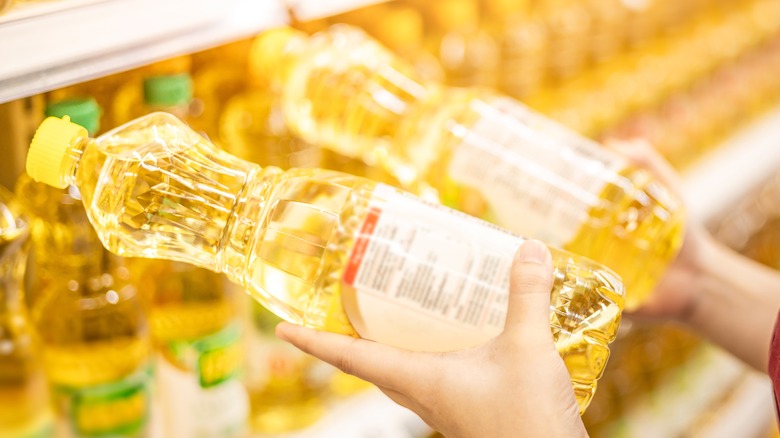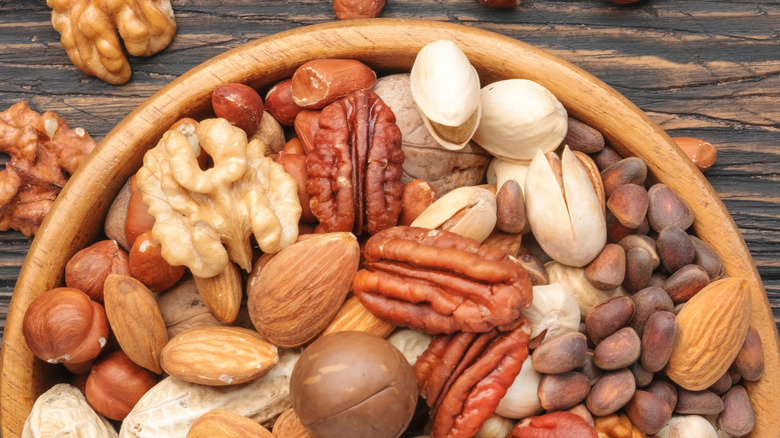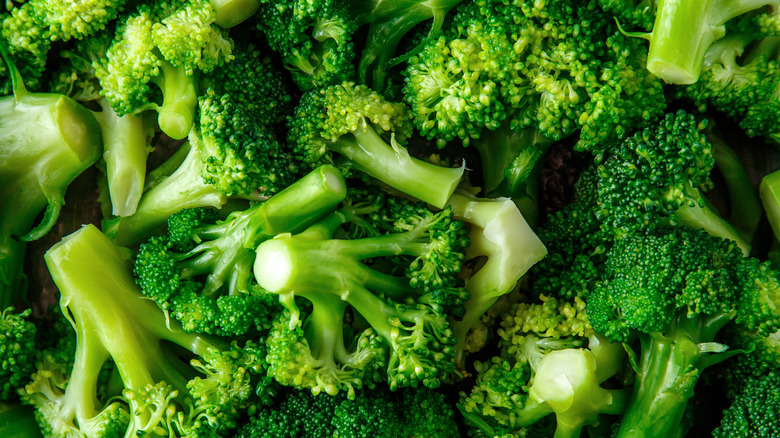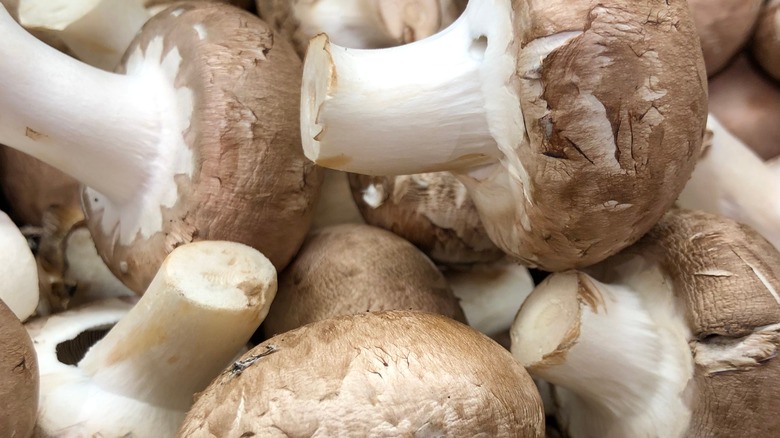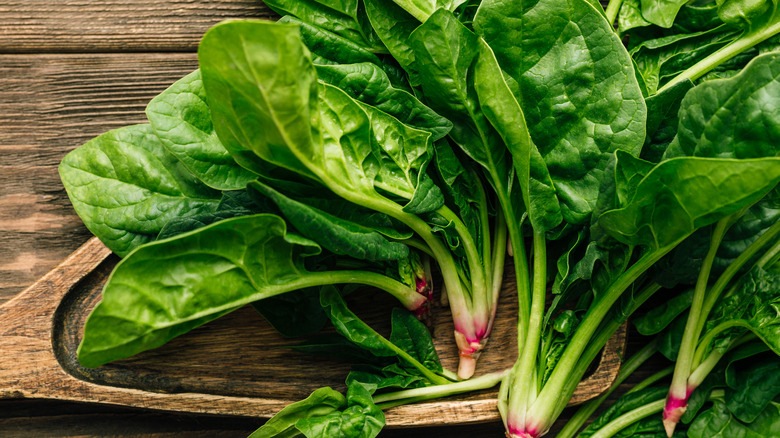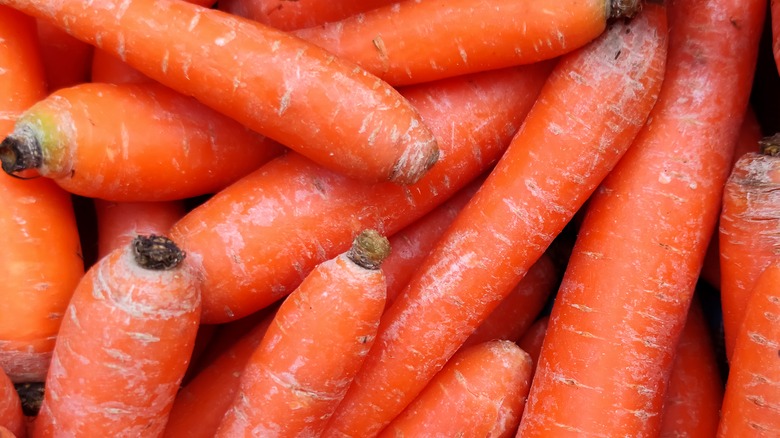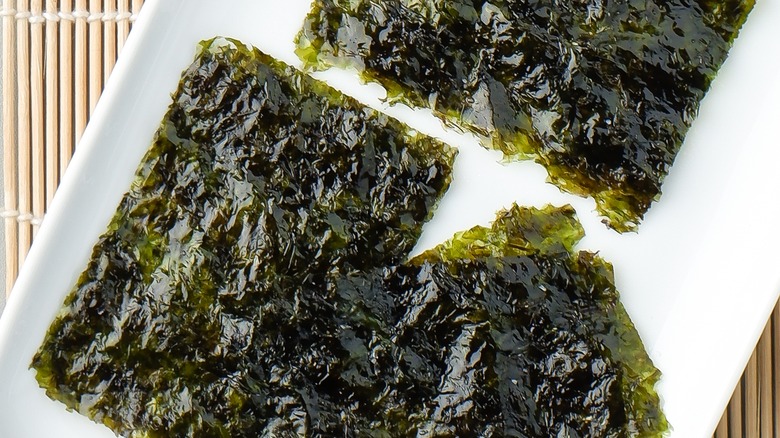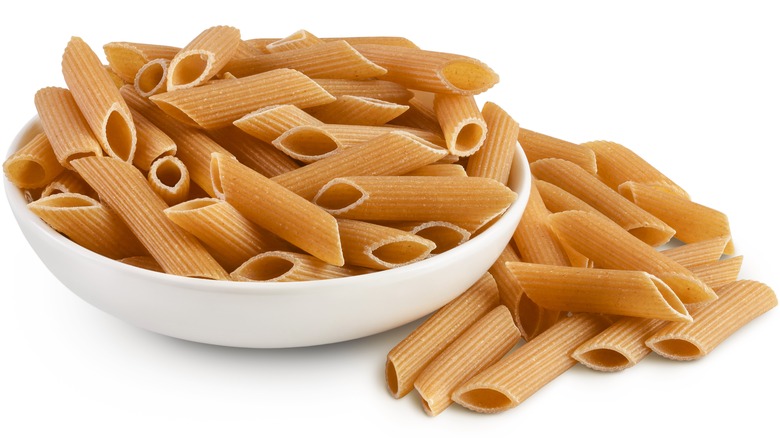Nutrients You Need To Think About If You're Going Plant-Based
There are plenty of reasons why people might want to eliminate or cut back on the animal products in their diet — and some of those reasons are based on health, as The Vegan Society highlights. A diet with less meat and dairy could be helpful in your goals toward maintaining a healthy weight, warding off chronic disease, improving your energy, or just being an environmentally conscious consumer.
But even though there are plenty of health benefits, there could be some health drawbacks if you're not being smart about it. As you might expect, cutting out food groups could leave your diet lacking. What's more, you might be filling up on plant foods that aren't as nutritionally dense. WebMD notes that cutting out food groups (and what it calls "misguided vegetarianism") can leave you with an unhealthy diet.
That's why it's important that you be smart about your plant-based choices: It could be the difference between a healthy lifestyle and a not-so-healthy one. To get you started, here are the nutrients you need to be aware of if you're going plant-based.
Types of plant-based diets
The idea of a plant-based diet is a little bit fluid. There are all kinds of levels to which people replace the animal products in their diet with plants. As the Mayo Clinic explains, there are lacto-vegetarian diets, ovo-vegetarian diets, lacto-ovo vegetarian diets, pescatarian diets, and vegan diets.
Somebody who is lacto-vegetarian would eat dairy products but no meat, while somebody who is ovo-vegetarian would keep eggs in their diet while cutting out the meat (and hence, a lacto-ovo vegetarian is someone who eats both). Pescatarians cut out meat but continue to eat fish, and vegans are those who eat no animal products whatsoever — no meat, poultry, dairy, eggs, or fish. Then there are flexitarians, who follow a vegetarian diet most of the time, but will have animal products occasionally.
Any of these diets will require some degree of conscious effort to get all the nutrients you need. So, which nutrients are going to be the hardest to get when you've cut out meat and dairy? Good question...
Protein
Protein might be the first nutrient that comes to mind. After all, it's a macronutrient, one of three major nutrients that your body derives energy from, along with carbohydrates and fats (via MD Anderson Cancer Center). Protein is what your body uses to build pretty much everything, from your organs and muscles to your bones and plasma. Everyone's protein needs will differ based on factors like their age and level of physical activity, but per the recommendation of the National Institutes of Health, you should aim to get a daily 0.8 grams of protein per kilogram of bodyweight.
There are plenty of plant-based protein sources. MD Anderson Cancer Center recommends lentils, beans, nuts, seeds, and whole grains (such as quinoa and oats). You can also try any products made from soy, including tofu and tempeh.
Because plant-based sources of protein don't have all nine essential amino acids the way animal-based protein does, it's important to eat complementary protein foods. However, you don't have to eat your complementary protein sources all at the same time, as was once believed, according to the American Dietetic Association. Instead, aim to get plenty of varied protein throughout the day.
Vitamin B12
Vitamin B12 is probably the most important nutrient you need to pay attention to, especially if you're going completely vegan all the time. That's because, as The Healthy explains, vitamin B12 is a nutrient that's found exclusively in animal products. So if you're a vegetarian who still eats dairy or eggs, you probably won't have any problems. But if you're sticking exclusively to plant-based products, then you're going to have to take supplements or eat fortified foods, such as cereal or nutritional yeast.
Vitamin B12 plays an important role in blood flow, so when you become deficient in this vitamin, it can sometimes take the form of anemia — specifically, what's known as megaloblastic anemia, which is characterized by a below-normal number of blood cells. This will cause you to feel weak and fatigued. Even if you don't develop anemia, your vitamin B12 deficiency could cause you to feel depressed and confused. You may even feel tingling in your hands and suffer from memory problems or poor balance.
Iron
While a vitamin B12 deficiency can cause anemia, that also happens to be the case with iron. In fact, The Vegan Society notes that iron is the most common deficiency around the world. In the case of iron-deficiency anemia, your blood cells are not able to carry oxygen all around your body, according to the Mayo Clinic. As you can imagine, this will leave you feeling pretty tired. Other symptoms include paleness, cold hands and feet, and poor appetite.
There are plenty of plant-based foods that provide iron. The Vegan Society recommends legumes and pulses like lentils, chickpeas, and beans, as well as nuts or seeds like cashews, chia, pumpkin seed, and hemp seeds. Dried fruit (including apricots, raisins, and figs) is another good source.
One thing to remember about iron is that plant-based iron doesn't get absorbed by your body as readily as animal iron. Therefore, you might need to consume more iron than a meat-eater would. Moreover, you should avoid consuming iron with things that would hinder its absorption, such as coffee or tea.
Vitamin C
You might be surprised to see vitamin C on this list. After all, you probably already know that vitamin C is found abundantly in fruits and vegetables. Great sources of vitamin C include oranges, tomatoes, strawberries, bell peppers, and other plans (via World of Vegan). So why would somebody eating a plant-based diet have to be conscious of the vitamin C they're getting?
This goes back to your body's need for iron. Even though plant-based iron doesn't absorb as readily into your body as animal-sourced iron does, vitamin C can help increase your body's potential for absorption. That's why it's smart for vegans and vegetarians to eat vitamin C food with any iron-rich foods they are eating. Plus, iron absorption aside, vitamin C plays an important role in many bodily functions, including immunity. It doesn't have to be complicated, though; World of Vegan actually recommends something as simple as a little bit of lemon juice with your iron foods.
Omega-3 fatty acids
Omega-3 fatty acids are pretty popular in most health circles, and for good reason. Omega-3 fatty acids are a type of essential fat that help you maintain a healthy heart, strong cognitive function, working kidneys, and good eyes and skin, according to the Physicians Committee for Responsible Medicine.
The thing is, most people think of omega-3 fatty acids as coming from some kind of fish source, such as salmon. But fish is by far the only source of omega-3 fatty acids, and it's not necessarily the best source. Instead, look to foods like flaxseeds, chia seeds, beans, walnuts, and edamame to get the omega-3 fatty acids you need. In fact, the Physicians Committee for Responsible Medicine notes that vegans tend to get more omega-3 than people who don't follow a vegan diet. This is likely because plant sources of omega-3s are an essential fatty acid known as alpha-linolenic acid, or ALA for short. Your body is then able to convert this into the longer-chain fatty acids you would typically get from fish sources.
Plant-based sources of omega-3s might even be the better option, as fish tends to also be high in saturated fat, which can contribute to poor heart health.
Omega-6 fatty acids
Omega-3 fatty acids aren't the only omegas you might hear about. You'll also hear people talk about omega-6 fatty acids. These fats are similar to omega-3s in that they are important for a healthy brain as well as healthy skin, hair, and bones, according to Medical News Today.
The only problem is that consuming disproportionately more omega-6 fatty acids compared with your omega-3s could set you up for certain health problems, including inflammation. So even though omega-6 fatty acids aren't necessarily lacking in a plant-based diet — great sources of omega 6s include grapeseed oil, sunflower seeds, corn oil, and soybean oil — you do want to be conscious of them so that you avoid having more omega-6s than you do omega-3s.
If you are somebody who is frequently eating foods that are sources of omega-6s, then it's wise to balance that out with flaxseeds and walnuts, which will provide you with omega-3s as well.
Zinc
There's one particular reason why zinc is such an important nutrient to know: Your body has no way of storing zinc the way it does certain other vitamins and minerals, so you need to be getting at least a little bit of it every day if you're going to avoid a deficiency, according to WebMD.
Zinc is an important mineral for maintaining a strong immune system and for healing wounds. Because zinc plays a role in growth, it's especially important that pregnant people, infants, and small children get enough zinc. Without enough zinc in your diet, you could suffer from a poor immune system, or you could have wounds that don't heal quickly. A zinc deficiency also might manifest itself in the form of hair loss or even loss of appetite or inability to taste things.
Many of the same foods that are recommended for protein and iron are, conveniently, very good sources of zinc as well. Try foods like legumes, nuts, and seeds, oats, and tofu.
Calcium
If you're like most people, you already associate milk with the mineral calcium — so if you're cutting milk and dairy products out of your diet, it makes sense that you might need to start thinking of other sources to get your calcium, which is important for strong bones and teeth, according to TofuBud. Calcium also plays an important role in muscle contractions, blood clotting, and heart function. Without calcium, you could be setting yourself up at risk for having low bone density and even developing osteoporosis.
But there are plenty of plant sources of calcium that you can add to your grocery list. First, if you're looking to replace your cow milk with a similar beverage, you might opt for a plant-based milk alternative, such as soy milk. TofuBud points out that, depending on the brand, soy milk might have more calcium than dairy milk. Even if a plant-based milk alternative doesn't naturally have a lot of calcium, it might be fortified to give it a boost of nutrition. Other plant-based sources of calcium include leafy greens, cruciferous vegetables, tofu, and even dried fruit, such as raisins.
Vitamin D
Maybe you've heard that you can get vitamin D from being out in the sun — and that's certainly true, as Better Health Channel explains. UV rays from sunlight touch your skin and prompt your body to produce vitamin D.
But as much as many of us would like to be outside every day, there are some people with sensitive skin who have to cover up, or their lifestyles require them to be indoors for most of daylight hours (especially in winter). Hence, people continue to aim for dietary vitamin D, which is found prominently in foods like fish, eggs, and liver. Additionally, milk products are often fortified with vitamin D.
That's not to say you can't get plenty of vitamin D on a plant-based diet, though. Vitamin D is found in mushrooms and vegetables such as carrots and broccoli, as well as fruits such as papaya, mango, and avocado. You can also count on fortified grains like oatmeal and cereal. Be sure you're getting plenty of vitamin D, as it is important for good bone health.
Vitamin K
It's important for plant-based eaters to be aware of vitamin K, but not for the reasons you might think. After all, vitamin K isn't exactly lacking in a plant-based diet. The most common sources of vitamin K are leafy greens like spinach, kale, collards, and swiss chard, according to Vegan Health. In fact, there are not many animal-based foods that would be considered prominent sources of vitamin K. So why should plant-based eaters pay attention?
Vitamin K is what's known as a fat-soluble vitamin. That means it's absorbed into your body via dietary fat (as opposed to water-soluble vitamins, which are absorbed into your body via water). Therefore, you need to eat vitamin K alongside some source of fat if your body is actually going to benefit from it. And sadly, foods like spinach and kale don't have much fat content. Fat from plant sources, such as olive oil and avocado, makes a great complement to these leafy greens.
Fortunately, most people — even plant-based eaters — get plenty of vitamin K in their diet. This vitamin is important for maintaining healthy bones and for ensuring your blood clots the way it's supposed to.
Vitamin A
Vitamin A serves two prominent purposes in your body. The first is to help your body maintain healthy immunity — not only fighting off sickness in the form of viruses and bacteria, but also protecting your cells from regular damage they endure just by nature of your being alive (via TofuBud). The other purpose vitamin A serves is maintaining healthy eyes.
Vitamin A is a nutrient similar to protein and iron in that the form you get from animal products is slightly different from the type you get from plant foods. Animal products like meat, eggs, and dairy are rich in what's known as preformed vitamin A, which is also referred to as retinol. On the other hand, plant products are rich in what's known as provitamin A or carotenoids. Strictly speaking, carotenoids are converted by the body into vitamin A during digestion (via MedlinePlus).
Fruits and vegetables that are rich in carotenoids are easy to identify because they're frequently orange or yellow in color. Carrots, sweet potatoes, apricots, butternut squash, and cantaloupe are all great options.
Iodine
If you're like most people, you might associate iodine with salt. That's because many table salts are iodized, making it easy for vegans and non-vegans to get this nutrient, according to the Harvard School of Public Health. Iodine is necessary for healthy thyroid function, allowing you to metabolize food into energy. If you're deficient in iodine, you will likely have low energy levels and may gain weight.
Not eating a lot of table salt? That's okay. You still might be getting plenty of iodine if it's found abundantly in the soil in your area. Locally grown produce in areas close to the sea usually contain iodine. Unfortunately for vegans who are not eating a lot of table salt or who live in areas with low levels of soil iodine, they have to be a little more conscious about getting adequate iodine. Most meat-eaters get this mineral from fish, dairy, and eggs.
For plant-based eaters, Vegan Food and Living recommends incorporating sea vegetables into your diet. Seaweed like nori, typically used as a wrap for sushi, is rich in iodine. Additionally, there is kelp, a type of algae, which can be consumed occasionally.
Selenium
Iodine isn't the only mineral that's found in the soil. According to Vegan Health, selenium is another mineral abundantly found in the soil, especially in North America, which explains why many Americans — even plant-based eaters — tend to get plenty of this trace mineral in their diet. As a trace mineral, selenium is something you need only in very small amounts, but it's necessary for protecting your body from oxidative damage and creating DNA.
The Harvard School of Public Health explains that selenium is typically found in organ meats and seafood. But if you're not eating animal products, you still have plenty of options. You can find selenium in whole-wheat pasta and couscous, sunflower seeds and sunflower seed butter, Brazil nuts, barley, wheat germ, and chia seeds. And although people in North America can have confidence that the selenium in their soil is being passed on to the foods grown in their location, people in Russia, Europe, and China may need to be a little more conscious, as their soils contain lower selenium levels.
